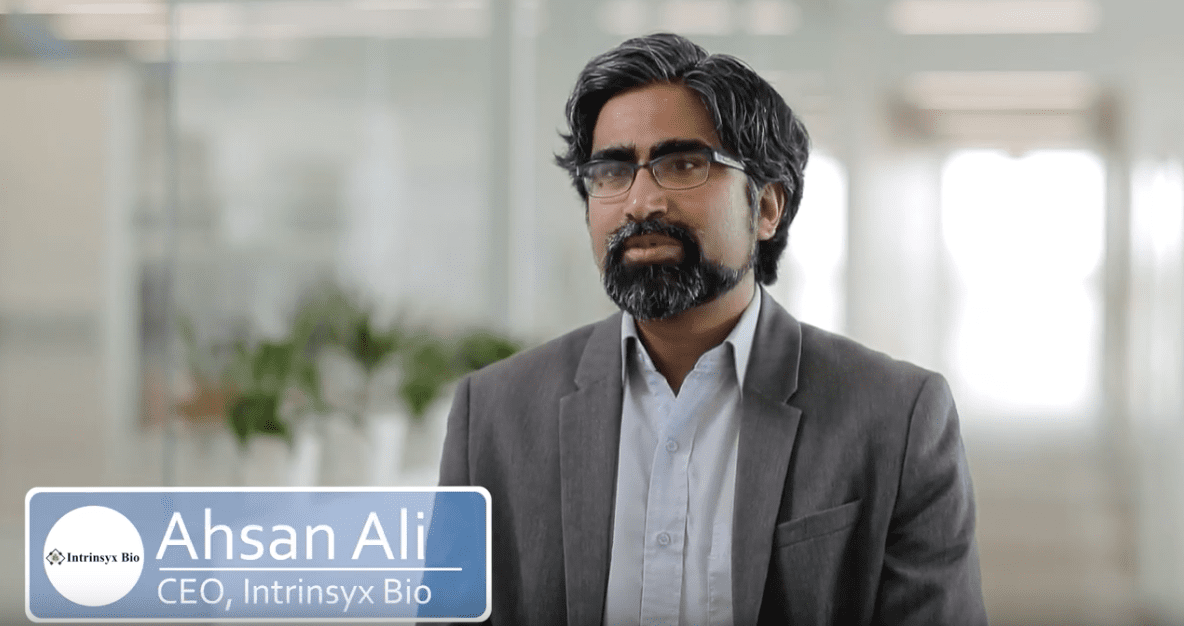Meet Our IN2 Cohort: Intrinsyx Bio
The Donald Danforth Plant Science Center is partnering with Wells Fargo and the National Renewable Energy Laboratory to participate in the Wells Fargo Innovation Incubator, IN2. The first ag cohort of companies will collaborate with our Principal Investigators to test their technologies. We will be sharing the stories behind these companies in a blog series throughout the summer.
Nitrogen is a nutrient that is key to a plant’s survival. While 80% of our atmosphere is made up of nitrogen, plants cannot use nitrogen when it is in a gaseous form. This is where legumes are a step ahead.
Legumes, like soybeans, have evolved the ability to form a highly specialized symbiotic relationship with a class of soil bacteria that transform atmospheric nitrogen into inorganic compounds from inside specialized root structures that the plant makes for their symbiotic partners.
Most plants are not legumes, though. As a result, they need nitrogen compounds added to their soil as fertilizer. Creating fertilizer comes at a cost to both the environment and farmers. The process to turn gaseous nitrogen into usable fertilizer requires heat, pressure, and large amounts of electricity, accounting for approximately 2% of global energy consumption. Fertilizer is also a large annual input cost for farmers across the country. When mineral nitrogen and other nutrients are washed off of farmers’ fields, they make their way into our waterways, eventually giving rise to blooms of algae that use up oxygen and release toxins that can cause significant fish death.
What if more crops could behave like legumes, and partner with microbes to convert atmospheric nitrogen into a usable form? Intrinsyx Bio is commercializing endophytes, microbes that colonize plants more generally than those that colonize legumes, living inside roots, stems, and leaves. By harnessing the power of a broader range of microbes that can convert nitrogen from the atmosphere without needing specialized root structures and broadening successful partnerships among plants and such soil microbes, Intrinsyx Bio expects to enable a wide variety of crops to thrive without the extensive application of mineral fertilizers and in harsher environments.
The co-founders of Intrinsyx, Ahsan Ali, Intrinsyx’s CEO and Dr. John Freeman, the company’s chief scientific officer, met while NASA contractors supporting space station biology research. John has been collaborating for decades with Dr. Sharon Doty, the University of Washington scientist who made the first discovery of the endophytic bacteria and yeast now the focus of Intrinsyx’s commercialization. Ahsan, Intrinsyx’s CEO, brings business management experience to the team and John is the scientist, with plant stress physiology and molecular biology expertise. Sharon remains a scientific advisor to the company from her position on the faculty of the University of Washington where she continues basic research to understand plant-endophyte interactions in natural systems.
The Danforth Center’s PIs Ivan Baxter and Becky Bart will perform key studies under the IN2 program to address how Intrinsyx’s microbes colonize one important crop, maize. This fundamental understanding of the mechanism that underlies this particular symbiotic relationship between plant hosts and microbes has the potential to identify the best plant microbe partnerships on which to focus for commercialization in the near-term and may also enable future breeding to optimize the symbiosis and the nitrogen fixing process among a wide array of crops.
Ivan Baxter’s expertise lies in plant nutrient uptake and plant genetics, especially in understanding the contributions of multiple genes whose products interact with the environment to determine quantitative phenotypes such as yield. Becky Bart’s expertise lies in the three-way interactions between hosts, microbes, and the environment. She studies both pathogenic and beneficial microbes.
Intrinsyx has up until now, operated leanly with limited funding and with initial investment from an accelerator. They credit the IN2 program with the opportunity to collaborate with plant scientists from a leading research institution and to gain access to world-class facilities, the combination of which would be difficult to replicate elsewhere. The IN2 project will benefit from the expertise of the Danforth Center scientists who bring novel ways to look at how plants are functioning as well as extensive infrastructure that is readily set up to answer key questions that Intrinsyx wants to address. Armed with results from the IN2 experiments and Danforth Center expertise, the Intrinsyx team anticipates that their efforts to secure investment for the commercialization of their innovation will be met with greater success.
